Leadership and Management: Theories, Styles, and Development
VerifiedAdded on 2020/10/22
|16
|4495
|157
Report
AI Summary
This report provides a comprehensive overview of leadership and management, starting with the core definitions of each. It explores the traits, skills, and various leadership styles, including autocratic, democratic, and laissez-faire. The report delves into theories such as Stogdill's trait theory and skill-based leadership, examining how leadership can be developed through critical thinking, communication, and discipline. It also differentiates between leadership and management, highlighting the importance of both for organizational success. Furthermore, the report discusses the path-goal theory and situational leadership, offering insights into how these approaches can be used to effectively lead and motivate teams in different scenarios. The report concludes with a discussion on leadership development and the importance of continuous learning.
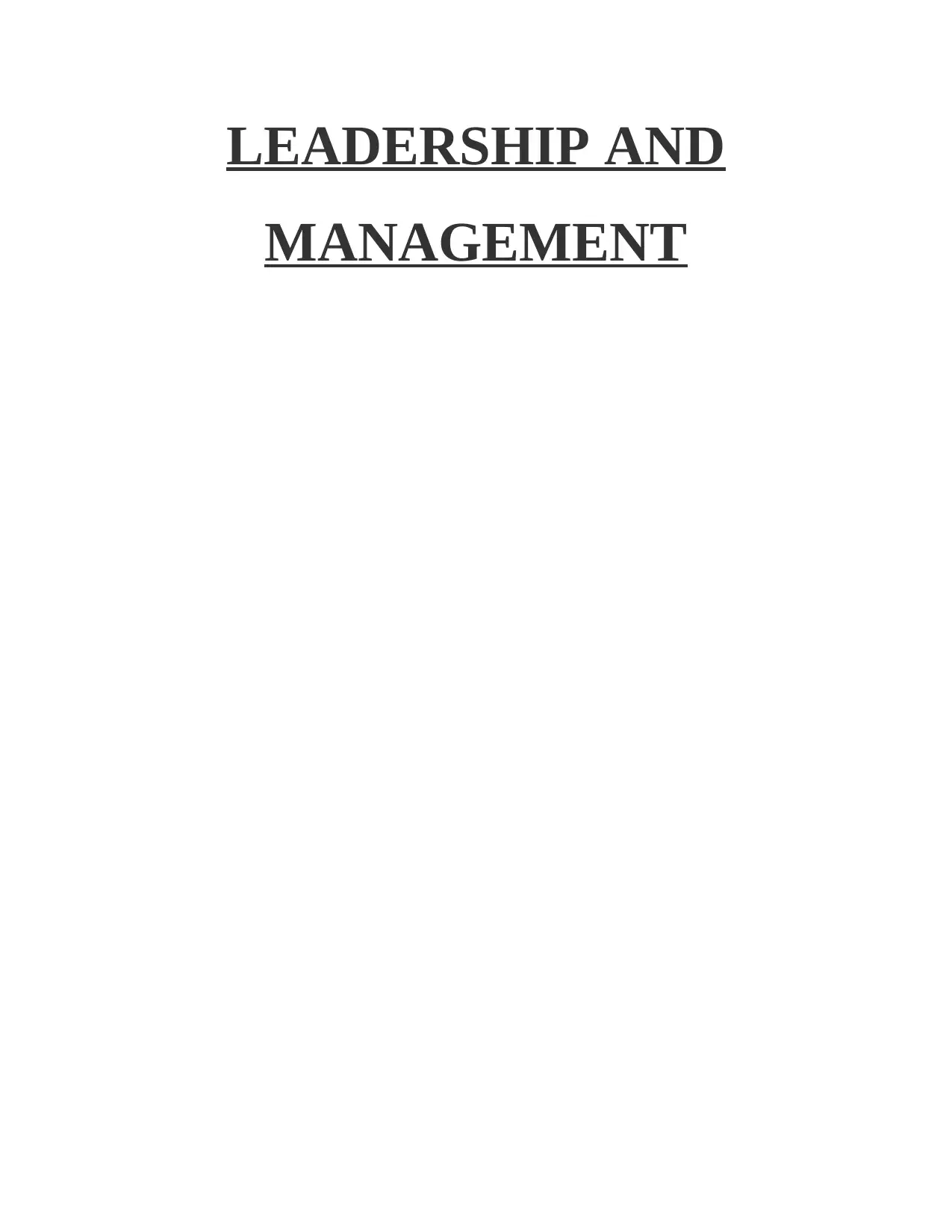
LEADERSHIP AND
MANAGEMENT
MANAGEMENT
Paraphrase This Document
Need a fresh take? Get an instant paraphrase of this document with our AI Paraphraser
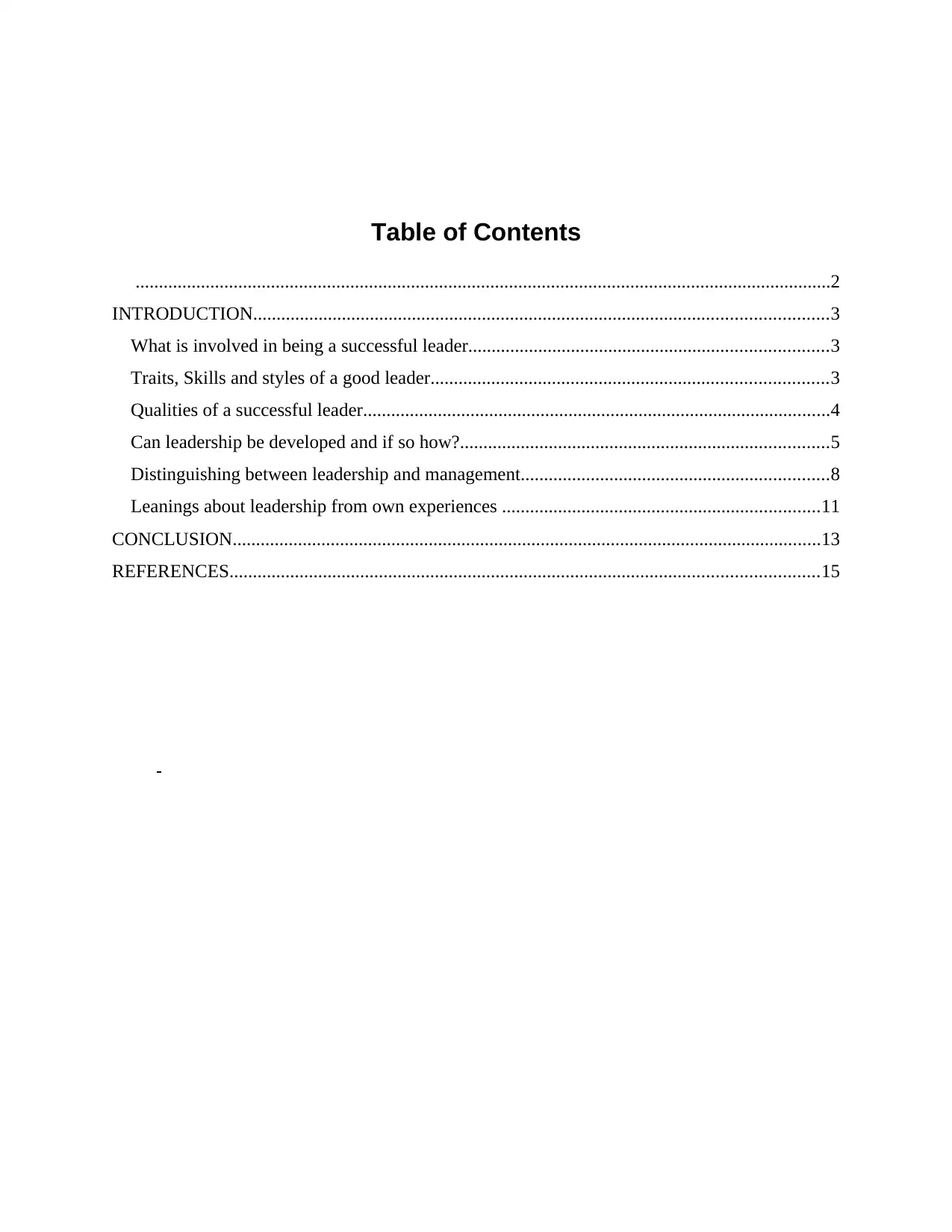
Table of Contents
.....................................................................................................................................................2
INTRODUCTION...........................................................................................................................3
What is involved in being a successful leader.............................................................................3
Traits, Skills and styles of a good leader.....................................................................................3
Qualities of a successful leader....................................................................................................4
Can leadership be developed and if so how?...............................................................................5
Distinguishing between leadership and management..................................................................8
Leanings about leadership from own experiences ....................................................................11
CONCLUSION..............................................................................................................................13
REFERENCES..............................................................................................................................15
.....................................................................................................................................................2
INTRODUCTION...........................................................................................................................3
What is involved in being a successful leader.............................................................................3
Traits, Skills and styles of a good leader.....................................................................................3
Qualities of a successful leader....................................................................................................4
Can leadership be developed and if so how?...............................................................................5
Distinguishing between leadership and management..................................................................8
Leanings about leadership from own experiences ....................................................................11
CONCLUSION..............................................................................................................................13
REFERENCES..............................................................................................................................15
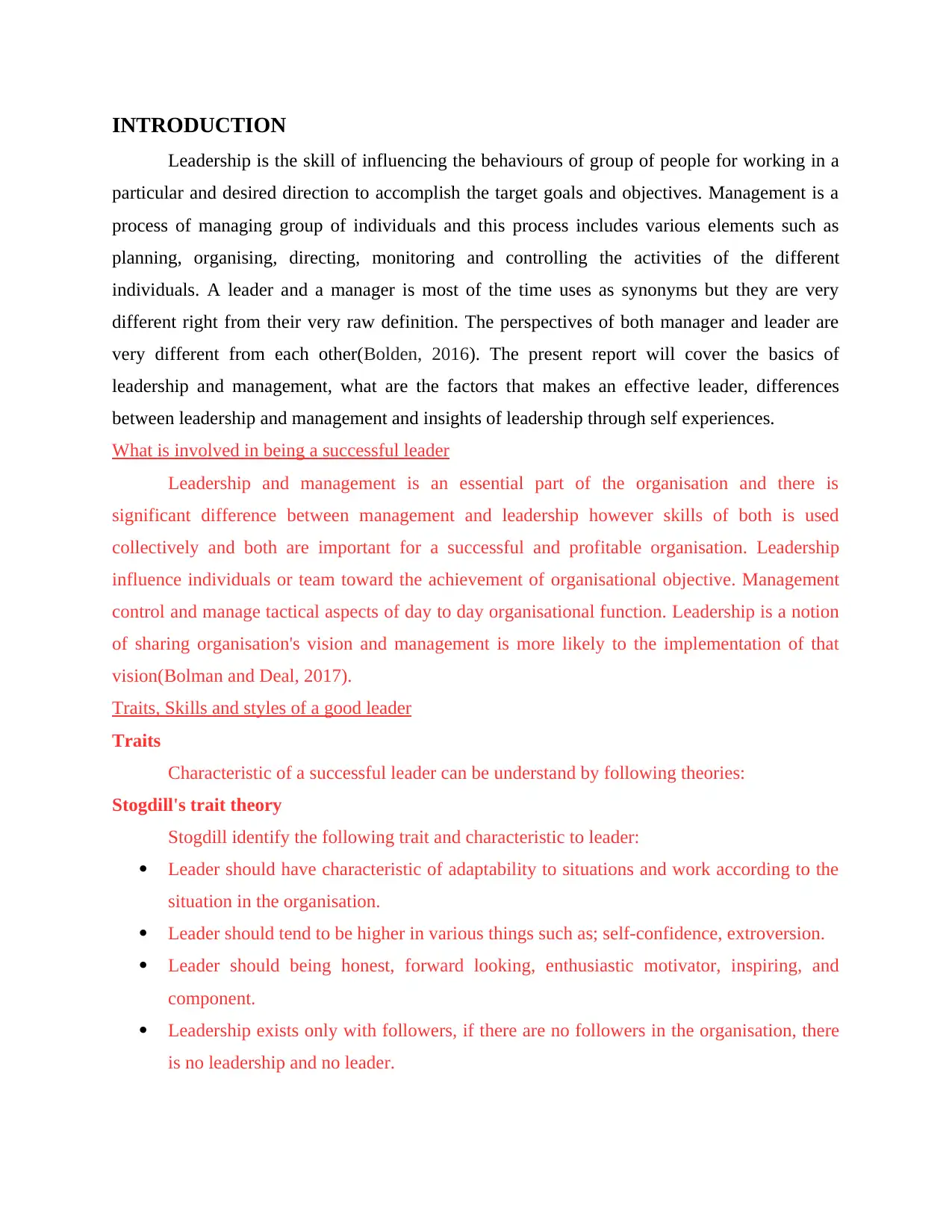
INTRODUCTION
Leadership is the skill of influencing the behaviours of group of people for working in a
particular and desired direction to accomplish the target goals and objectives. Management is a
process of managing group of individuals and this process includes various elements such as
planning, organising, directing, monitoring and controlling the activities of the different
individuals. A leader and a manager is most of the time uses as synonyms but they are very
different right from their very raw definition. The perspectives of both manager and leader are
very different from each other(Bolden, 2016). The present report will cover the basics of
leadership and management, what are the factors that makes an effective leader, differences
between leadership and management and insights of leadership through self experiences.
What is involved in being a successful leader
Leadership and management is an essential part of the organisation and there is
significant difference between management and leadership however skills of both is used
collectively and both are important for a successful and profitable organisation. Leadership
influence individuals or team toward the achievement of organisational objective. Management
control and manage tactical aspects of day to day organisational function. Leadership is a notion
of sharing organisation's vision and management is more likely to the implementation of that
vision(Bolman and Deal, 2017).
Traits, Skills and styles of a good leader
Traits
Characteristic of a successful leader can be understand by following theories:
Stogdill's trait theory
Stogdill identify the following trait and characteristic to leader:
Leader should have characteristic of adaptability to situations and work according to the
situation in the organisation.
Leader should tend to be higher in various things such as; self-confidence, extroversion.
Leader should being honest, forward looking, enthusiastic motivator, inspiring, and
component.
Leadership exists only with followers, if there are no followers in the organisation, there
is no leadership and no leader.
Leadership is the skill of influencing the behaviours of group of people for working in a
particular and desired direction to accomplish the target goals and objectives. Management is a
process of managing group of individuals and this process includes various elements such as
planning, organising, directing, monitoring and controlling the activities of the different
individuals. A leader and a manager is most of the time uses as synonyms but they are very
different right from their very raw definition. The perspectives of both manager and leader are
very different from each other(Bolden, 2016). The present report will cover the basics of
leadership and management, what are the factors that makes an effective leader, differences
between leadership and management and insights of leadership through self experiences.
What is involved in being a successful leader
Leadership and management is an essential part of the organisation and there is
significant difference between management and leadership however skills of both is used
collectively and both are important for a successful and profitable organisation. Leadership
influence individuals or team toward the achievement of organisational objective. Management
control and manage tactical aspects of day to day organisational function. Leadership is a notion
of sharing organisation's vision and management is more likely to the implementation of that
vision(Bolman and Deal, 2017).
Traits, Skills and styles of a good leader
Traits
Characteristic of a successful leader can be understand by following theories:
Stogdill's trait theory
Stogdill identify the following trait and characteristic to leader:
Leader should have characteristic of adaptability to situations and work according to the
situation in the organisation.
Leader should tend to be higher in various things such as; self-confidence, extroversion.
Leader should being honest, forward looking, enthusiastic motivator, inspiring, and
component.
Leadership exists only with followers, if there are no followers in the organisation, there
is no leadership and no leader.
⊘ This is a preview!⊘
Do you want full access?
Subscribe today to unlock all pages.

Trusted by 1+ million students worldwide
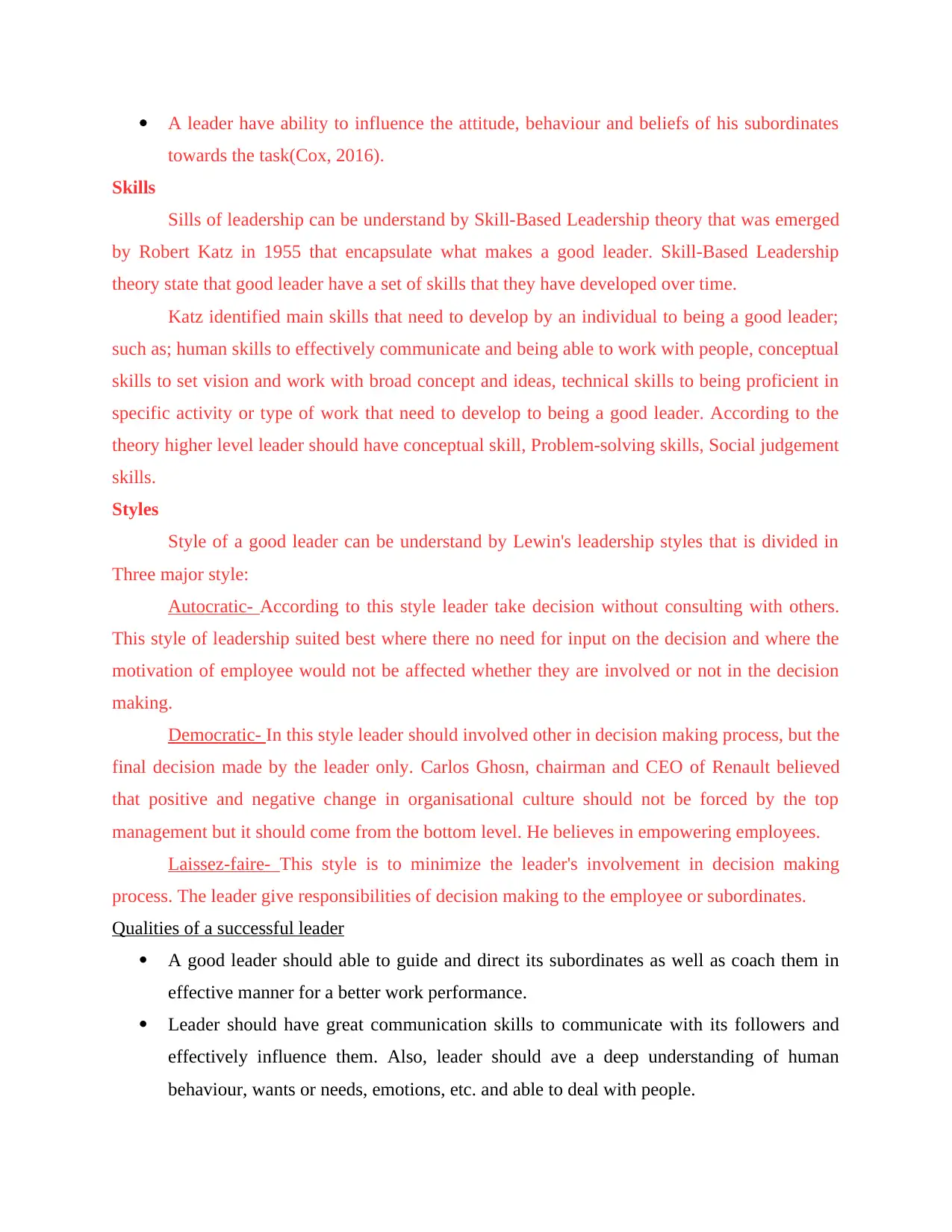
A leader have ability to influence the attitude, behaviour and beliefs of his subordinates
towards the task(Cox, 2016).
Skills
Sills of leadership can be understand by Skill-Based Leadership theory that was emerged
by Robert Katz in 1955 that encapsulate what makes a good leader. Skill-Based Leadership
theory state that good leader have a set of skills that they have developed over time.
Katz identified main skills that need to develop by an individual to being a good leader;
such as; human skills to effectively communicate and being able to work with people, conceptual
skills to set vision and work with broad concept and ideas, technical skills to being proficient in
specific activity or type of work that need to develop to being a good leader. According to the
theory higher level leader should have conceptual skill, Problem-solving skills, Social judgement
skills.
Styles
Style of a good leader can be understand by Lewin's leadership styles that is divided in
Three major style:
Autocratic- According to this style leader take decision without consulting with others.
This style of leadership suited best where there no need for input on the decision and where the
motivation of employee would not be affected whether they are involved or not in the decision
making.
Democratic- In this style leader should involved other in decision making process, but the
final decision made by the leader only. Carlos Ghosn, chairman and CEO of Renault believed
that positive and negative change in organisational culture should not be forced by the top
management but it should come from the bottom level. He believes in empowering employees.
Laissez-faire- This style is to minimize the leader's involvement in decision making
process. The leader give responsibilities of decision making to the employee or subordinates.
Qualities of a successful leader
A good leader should able to guide and direct its subordinates as well as coach them in
effective manner for a better work performance.
Leader should have great communication skills to communicate with its followers and
effectively influence them. Also, leader should ave a deep understanding of human
behaviour, wants or needs, emotions, etc. and able to deal with people.
towards the task(Cox, 2016).
Skills
Sills of leadership can be understand by Skill-Based Leadership theory that was emerged
by Robert Katz in 1955 that encapsulate what makes a good leader. Skill-Based Leadership
theory state that good leader have a set of skills that they have developed over time.
Katz identified main skills that need to develop by an individual to being a good leader;
such as; human skills to effectively communicate and being able to work with people, conceptual
skills to set vision and work with broad concept and ideas, technical skills to being proficient in
specific activity or type of work that need to develop to being a good leader. According to the
theory higher level leader should have conceptual skill, Problem-solving skills, Social judgement
skills.
Styles
Style of a good leader can be understand by Lewin's leadership styles that is divided in
Three major style:
Autocratic- According to this style leader take decision without consulting with others.
This style of leadership suited best where there no need for input on the decision and where the
motivation of employee would not be affected whether they are involved or not in the decision
making.
Democratic- In this style leader should involved other in decision making process, but the
final decision made by the leader only. Carlos Ghosn, chairman and CEO of Renault believed
that positive and negative change in organisational culture should not be forced by the top
management but it should come from the bottom level. He believes in empowering employees.
Laissez-faire- This style is to minimize the leader's involvement in decision making
process. The leader give responsibilities of decision making to the employee or subordinates.
Qualities of a successful leader
A good leader should able to guide and direct its subordinates as well as coach them in
effective manner for a better work performance.
Leader should have great communication skills to communicate with its followers and
effectively influence them. Also, leader should ave a deep understanding of human
behaviour, wants or needs, emotions, etc. and able to deal with people.
Paraphrase This Document
Need a fresh take? Get an instant paraphrase of this document with our AI Paraphraser
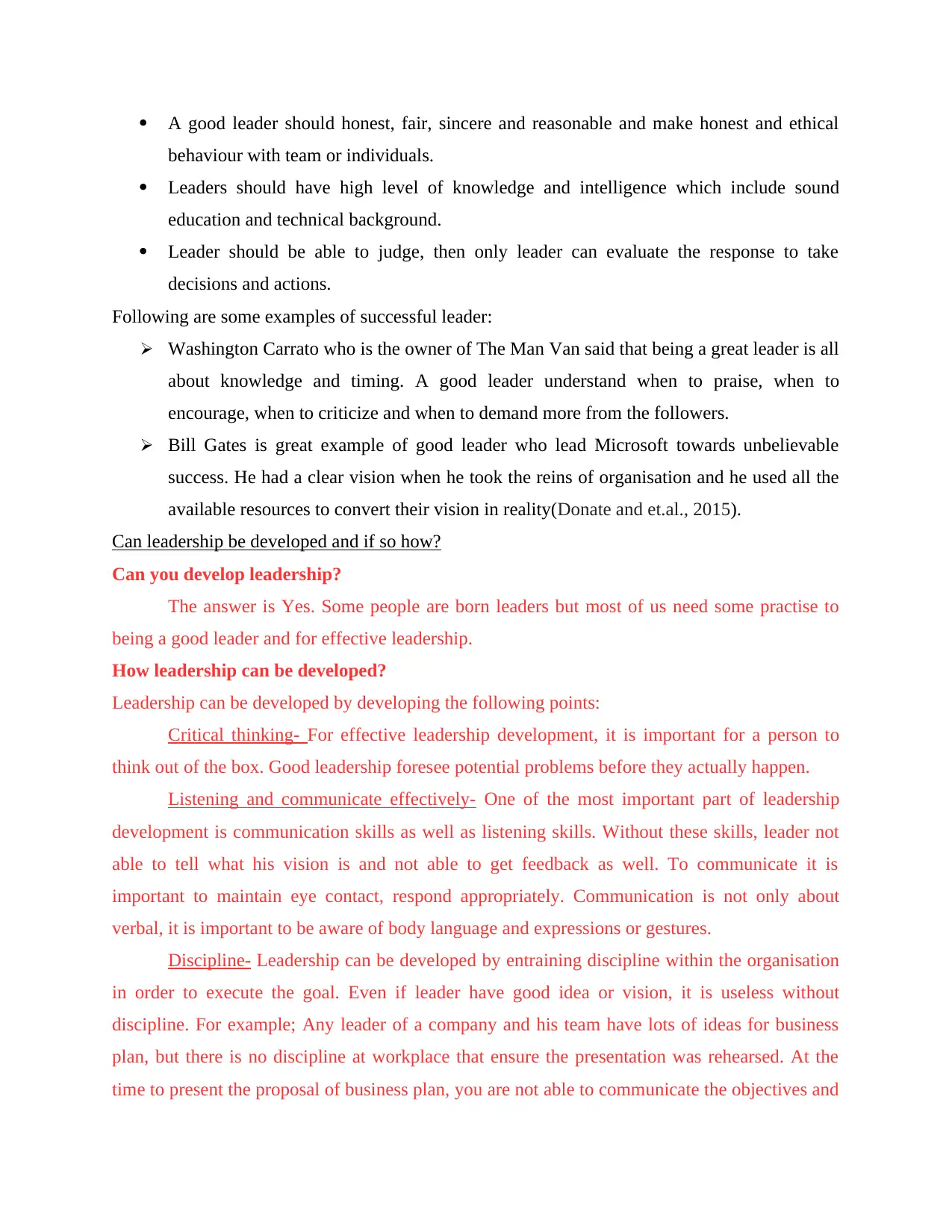
A good leader should honest, fair, sincere and reasonable and make honest and ethical
behaviour with team or individuals.
Leaders should have high level of knowledge and intelligence which include sound
education and technical background.
Leader should be able to judge, then only leader can evaluate the response to take
decisions and actions.
Following are some examples of successful leader:
Washington Carrato who is the owner of The Man Van said that being a great leader is all
about knowledge and timing. A good leader understand when to praise, when to
encourage, when to criticize and when to demand more from the followers.
Bill Gates is great example of good leader who lead Microsoft towards unbelievable
success. He had a clear vision when he took the reins of organisation and he used all the
available resources to convert their vision in reality(Donate and et.al., 2015).
Can leadership be developed and if so how?
Can you develop leadership?
The answer is Yes. Some people are born leaders but most of us need some practise to
being a good leader and for effective leadership.
How leadership can be developed?
Leadership can be developed by developing the following points:
Critical thinking- For effective leadership development, it is important for a person to
think out of the box. Good leadership foresee potential problems before they actually happen.
Listening and communicate effectively- One of the most important part of leadership
development is communication skills as well as listening skills. Without these skills, leader not
able to tell what his vision is and not able to get feedback as well. To communicate it is
important to maintain eye contact, respond appropriately. Communication is not only about
verbal, it is important to be aware of body language and expressions or gestures.
Discipline- Leadership can be developed by entraining discipline within the organisation
in order to execute the goal. Even if leader have good idea or vision, it is useless without
discipline. For example; Any leader of a company and his team have lots of ideas for business
plan, but there is no discipline at workplace that ensure the presentation was rehearsed. At the
time to present the proposal of business plan, you are not able to communicate the objectives and
behaviour with team or individuals.
Leaders should have high level of knowledge and intelligence which include sound
education and technical background.
Leader should be able to judge, then only leader can evaluate the response to take
decisions and actions.
Following are some examples of successful leader:
Washington Carrato who is the owner of The Man Van said that being a great leader is all
about knowledge and timing. A good leader understand when to praise, when to
encourage, when to criticize and when to demand more from the followers.
Bill Gates is great example of good leader who lead Microsoft towards unbelievable
success. He had a clear vision when he took the reins of organisation and he used all the
available resources to convert their vision in reality(Donate and et.al., 2015).
Can leadership be developed and if so how?
Can you develop leadership?
The answer is Yes. Some people are born leaders but most of us need some practise to
being a good leader and for effective leadership.
How leadership can be developed?
Leadership can be developed by developing the following points:
Critical thinking- For effective leadership development, it is important for a person to
think out of the box. Good leadership foresee potential problems before they actually happen.
Listening and communicate effectively- One of the most important part of leadership
development is communication skills as well as listening skills. Without these skills, leader not
able to tell what his vision is and not able to get feedback as well. To communicate it is
important to maintain eye contact, respond appropriately. Communication is not only about
verbal, it is important to be aware of body language and expressions or gestures.
Discipline- Leadership can be developed by entraining discipline within the organisation
in order to execute the goal. Even if leader have good idea or vision, it is useless without
discipline. For example; Any leader of a company and his team have lots of ideas for business
plan, but there is no discipline at workplace that ensure the presentation was rehearsed. At the
time to present the proposal of business plan, you are not able to communicate the objectives and
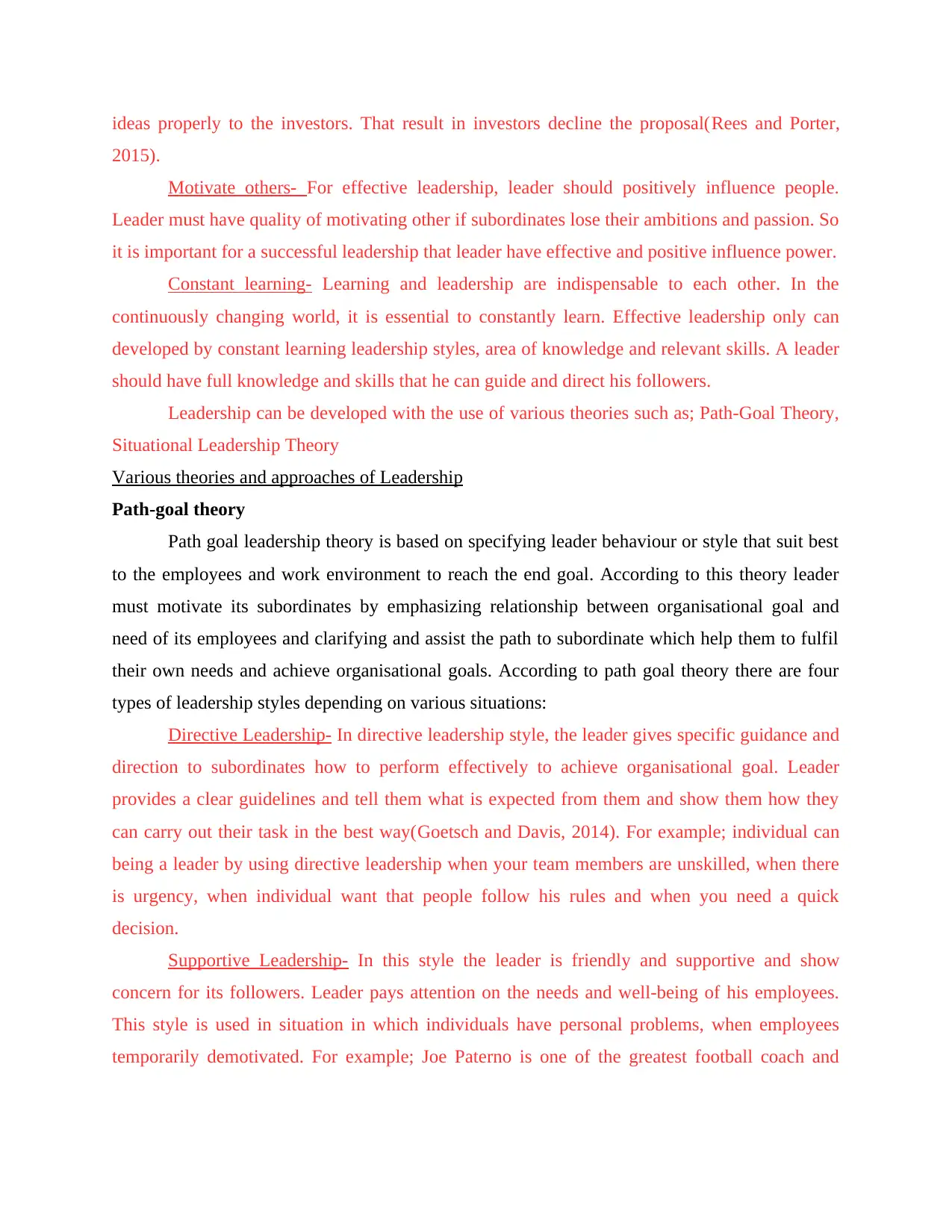
ideas properly to the investors. That result in investors decline the proposal(Rees and Porter,
2015).
Motivate others- For effective leadership, leader should positively influence people.
Leader must have quality of motivating other if subordinates lose their ambitions and passion. So
it is important for a successful leadership that leader have effective and positive influence power.
Constant learning- Learning and leadership are indispensable to each other. In the
continuously changing world, it is essential to constantly learn. Effective leadership only can
developed by constant learning leadership styles, area of knowledge and relevant skills. A leader
should have full knowledge and skills that he can guide and direct his followers.
Leadership can be developed with the use of various theories such as; Path-Goal Theory,
Situational Leadership Theory
Various theories and approaches of Leadership
Path-goal theory
Path goal leadership theory is based on specifying leader behaviour or style that suit best
to the employees and work environment to reach the end goal. According to this theory leader
must motivate its subordinates by emphasizing relationship between organisational goal and
need of its employees and clarifying and assist the path to subordinate which help them to fulfil
their own needs and achieve organisational goals. According to path goal theory there are four
types of leadership styles depending on various situations:
Directive Leadership- In directive leadership style, the leader gives specific guidance and
direction to subordinates how to perform effectively to achieve organisational goal. Leader
provides a clear guidelines and tell them what is expected from them and show them how they
can carry out their task in the best way(Goetsch and Davis, 2014). For example; individual can
being a leader by using directive leadership when your team members are unskilled, when there
is urgency, when individual want that people follow his rules and when you need a quick
decision.
Supportive Leadership- In this style the leader is friendly and supportive and show
concern for its followers. Leader pays attention on the needs and well-being of his employees.
This style is used in situation in which individuals have personal problems, when employees
temporarily demotivated. For example; Joe Paterno is one of the greatest football coach and
2015).
Motivate others- For effective leadership, leader should positively influence people.
Leader must have quality of motivating other if subordinates lose their ambitions and passion. So
it is important for a successful leadership that leader have effective and positive influence power.
Constant learning- Learning and leadership are indispensable to each other. In the
continuously changing world, it is essential to constantly learn. Effective leadership only can
developed by constant learning leadership styles, area of knowledge and relevant skills. A leader
should have full knowledge and skills that he can guide and direct his followers.
Leadership can be developed with the use of various theories such as; Path-Goal Theory,
Situational Leadership Theory
Various theories and approaches of Leadership
Path-goal theory
Path goal leadership theory is based on specifying leader behaviour or style that suit best
to the employees and work environment to reach the end goal. According to this theory leader
must motivate its subordinates by emphasizing relationship between organisational goal and
need of its employees and clarifying and assist the path to subordinate which help them to fulfil
their own needs and achieve organisational goals. According to path goal theory there are four
types of leadership styles depending on various situations:
Directive Leadership- In directive leadership style, the leader gives specific guidance and
direction to subordinates how to perform effectively to achieve organisational goal. Leader
provides a clear guidelines and tell them what is expected from them and show them how they
can carry out their task in the best way(Goetsch and Davis, 2014). For example; individual can
being a leader by using directive leadership when your team members are unskilled, when there
is urgency, when individual want that people follow his rules and when you need a quick
decision.
Supportive Leadership- In this style the leader is friendly and supportive and show
concern for its followers. Leader pays attention on the needs and well-being of his employees.
This style is used in situation in which individuals have personal problems, when employees
temporarily demotivated. For example; Joe Paterno is one of the greatest football coach and
⊘ This is a preview!⊘
Do you want full access?
Subscribe today to unlock all pages.

Trusted by 1+ million students worldwide
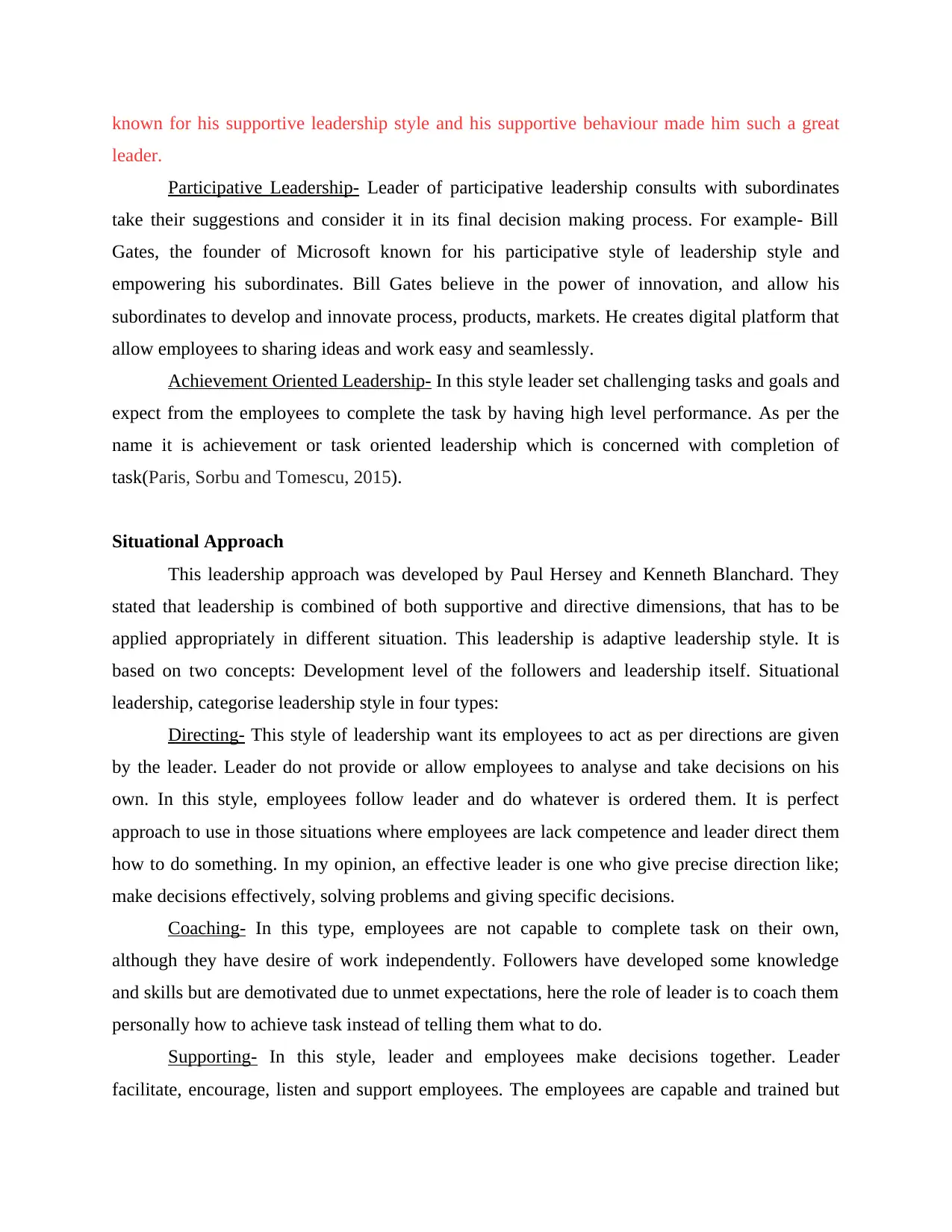
known for his supportive leadership style and his supportive behaviour made him such a great
leader.
Participative Leadership- Leader of participative leadership consults with subordinates
take their suggestions and consider it in its final decision making process. For example- Bill
Gates, the founder of Microsoft known for his participative style of leadership style and
empowering his subordinates. Bill Gates believe in the power of innovation, and allow his
subordinates to develop and innovate process, products, markets. He creates digital platform that
allow employees to sharing ideas and work easy and seamlessly.
Achievement Oriented Leadership- In this style leader set challenging tasks and goals and
expect from the employees to complete the task by having high level performance. As per the
name it is achievement or task oriented leadership which is concerned with completion of
task(Paris, Sоrbu and Tomescu, 2015).
Situational Approach
This leadership approach was developed by Paul Hersey and Kenneth Blanchard. They
stated that leadership is combined of both supportive and directive dimensions, that has to be
applied appropriately in different situation. This leadership is adaptive leadership style. It is
based on two concepts: Development level of the followers and leadership itself. Situational
leadership, categorise leadership style in four types:
Directing- This style of leadership want its employees to act as per directions are given
by the leader. Leader do not provide or allow employees to analyse and take decisions on his
own. In this style, employees follow leader and do whatever is ordered them. It is perfect
approach to use in those situations where employees are lack competence and leader direct them
how to do something. In my opinion, an effective leader is one who give precise direction like;
make decisions effectively, solving problems and giving specific decisions.
Coaching- In this type, employees are not capable to complete task on their own,
although they have desire of work independently. Followers have developed some knowledge
and skills but are demotivated due to unmet expectations, here the role of leader is to coach them
personally how to achieve task instead of telling them what to do.
Supporting- In this style, leader and employees make decisions together. Leader
facilitate, encourage, listen and support employees. The employees are capable and trained but
leader.
Participative Leadership- Leader of participative leadership consults with subordinates
take their suggestions and consider it in its final decision making process. For example- Bill
Gates, the founder of Microsoft known for his participative style of leadership style and
empowering his subordinates. Bill Gates believe in the power of innovation, and allow his
subordinates to develop and innovate process, products, markets. He creates digital platform that
allow employees to sharing ideas and work easy and seamlessly.
Achievement Oriented Leadership- In this style leader set challenging tasks and goals and
expect from the employees to complete the task by having high level performance. As per the
name it is achievement or task oriented leadership which is concerned with completion of
task(Paris, Sоrbu and Tomescu, 2015).
Situational Approach
This leadership approach was developed by Paul Hersey and Kenneth Blanchard. They
stated that leadership is combined of both supportive and directive dimensions, that has to be
applied appropriately in different situation. This leadership is adaptive leadership style. It is
based on two concepts: Development level of the followers and leadership itself. Situational
leadership, categorise leadership style in four types:
Directing- This style of leadership want its employees to act as per directions are given
by the leader. Leader do not provide or allow employees to analyse and take decisions on his
own. In this style, employees follow leader and do whatever is ordered them. It is perfect
approach to use in those situations where employees are lack competence and leader direct them
how to do something. In my opinion, an effective leader is one who give precise direction like;
make decisions effectively, solving problems and giving specific decisions.
Coaching- In this type, employees are not capable to complete task on their own,
although they have desire of work independently. Followers have developed some knowledge
and skills but are demotivated due to unmet expectations, here the role of leader is to coach them
personally how to achieve task instead of telling them what to do.
Supporting- In this style, leader and employees make decisions together. Leader
facilitate, encourage, listen and support employees. The employees are capable and trained but
Paraphrase This Document
Need a fresh take? Get an instant paraphrase of this document with our AI Paraphraser
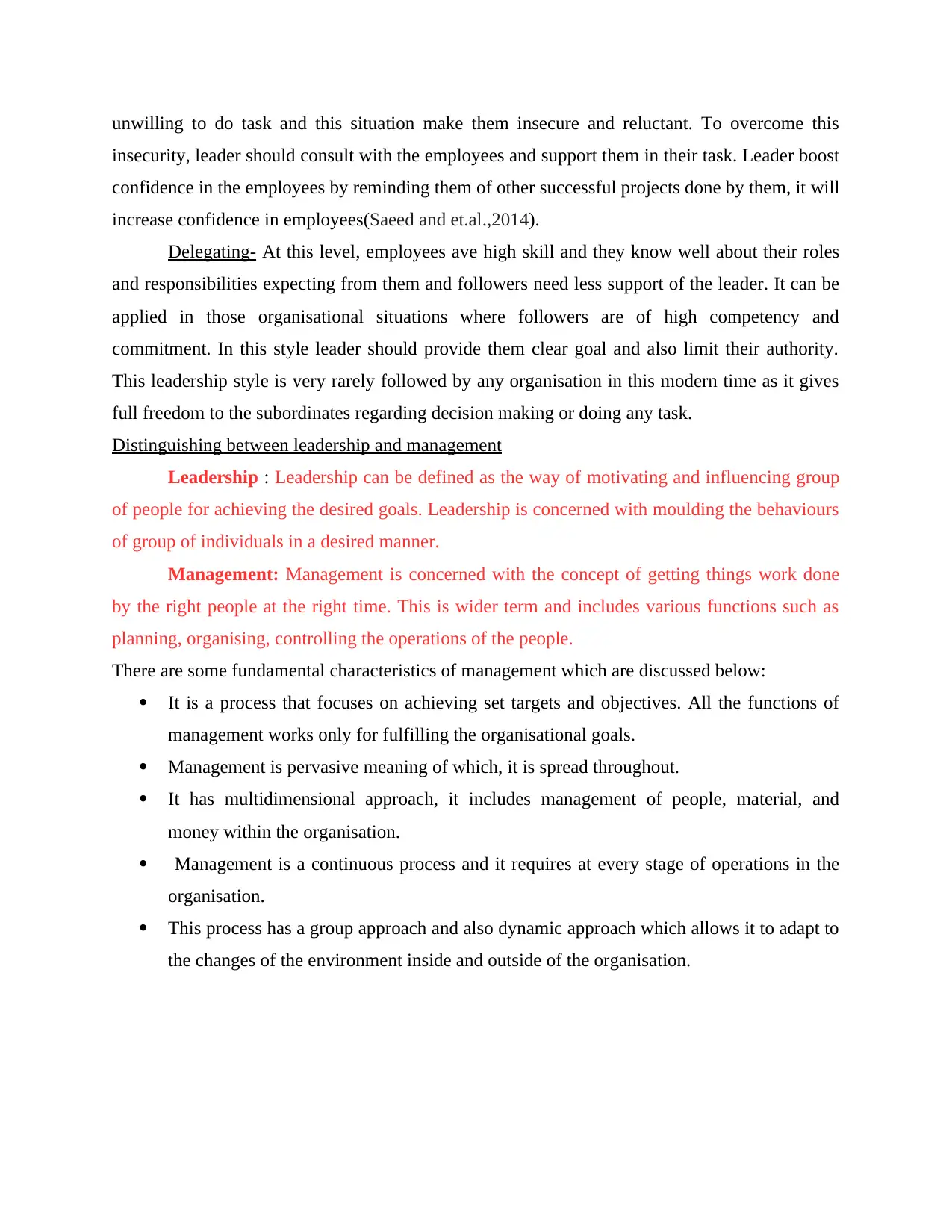
unwilling to do task and this situation make them insecure and reluctant. To overcome this
insecurity, leader should consult with the employees and support them in their task. Leader boost
confidence in the employees by reminding them of other successful projects done by them, it will
increase confidence in employees(Saeed and et.al.,2014).
Delegating- At this level, employees ave high skill and they know well about their roles
and responsibilities expecting from them and followers need less support of the leader. It can be
applied in those organisational situations where followers are of high competency and
commitment. In this style leader should provide them clear goal and also limit their authority.
This leadership style is very rarely followed by any organisation in this modern time as it gives
full freedom to the subordinates regarding decision making or doing any task.
Distinguishing between leadership and management
Leadership : Leadership can be defined as the way of motivating and influencing group
of people for achieving the desired goals. Leadership is concerned with moulding the behaviours
of group of individuals in a desired manner.
Management: Management is concerned with the concept of getting things work done
by the right people at the right time. This is wider term and includes various functions such as
planning, organising, controlling the operations of the people.
There are some fundamental characteristics of management which are discussed below:
It is a process that focuses on achieving set targets and objectives. All the functions of
management works only for fulfilling the organisational goals.
Management is pervasive meaning of which, it is spread throughout.
It has multidimensional approach, it includes management of people, material, and
money within the organisation.
Management is a continuous process and it requires at every stage of operations in the
organisation.
This process has a group approach and also dynamic approach which allows it to adapt to
the changes of the environment inside and outside of the organisation.
insecurity, leader should consult with the employees and support them in their task. Leader boost
confidence in the employees by reminding them of other successful projects done by them, it will
increase confidence in employees(Saeed and et.al.,2014).
Delegating- At this level, employees ave high skill and they know well about their roles
and responsibilities expecting from them and followers need less support of the leader. It can be
applied in those organisational situations where followers are of high competency and
commitment. In this style leader should provide them clear goal and also limit their authority.
This leadership style is very rarely followed by any organisation in this modern time as it gives
full freedom to the subordinates regarding decision making or doing any task.
Distinguishing between leadership and management
Leadership : Leadership can be defined as the way of motivating and influencing group
of people for achieving the desired goals. Leadership is concerned with moulding the behaviours
of group of individuals in a desired manner.
Management: Management is concerned with the concept of getting things work done
by the right people at the right time. This is wider term and includes various functions such as
planning, organising, controlling the operations of the people.
There are some fundamental characteristics of management which are discussed below:
It is a process that focuses on achieving set targets and objectives. All the functions of
management works only for fulfilling the organisational goals.
Management is pervasive meaning of which, it is spread throughout.
It has multidimensional approach, it includes management of people, material, and
money within the organisation.
Management is a continuous process and it requires at every stage of operations in the
organisation.
This process has a group approach and also dynamic approach which allows it to adapt to
the changes of the environment inside and outside of the organisation.
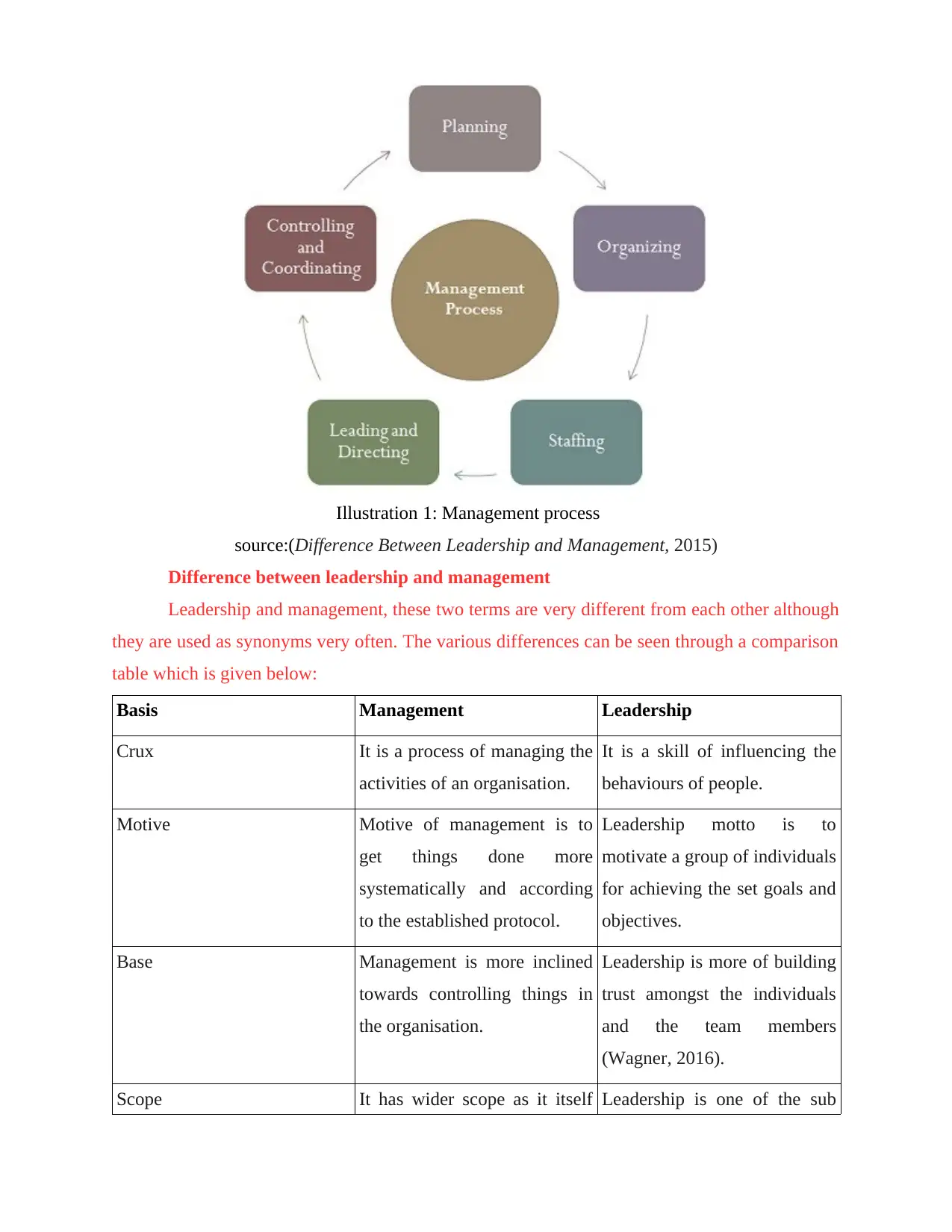
Illustration 1: Management process
source:(Difference Between Leadership and Management, 2015)
Difference between leadership and management
Leadership and management, these two terms are very different from each other although
they are used as synonyms very often. The various differences can be seen through a comparison
table which is given below:
Basis Management Leadership
Crux It is a process of managing the
activities of an organisation.
It is a skill of influencing the
behaviours of people.
Motive Motive of management is to
get things done more
systematically and according
to the established protocol.
Leadership motto is to
motivate a group of individuals
for achieving the set goals and
objectives.
Base Management is more inclined
towards controlling things in
the organisation.
Leadership is more of building
trust amongst the individuals
and the team members
(Wagner, 2016).
Scope It has wider scope as it itself Leadership is one of the sub
source:(Difference Between Leadership and Management, 2015)
Difference between leadership and management
Leadership and management, these two terms are very different from each other although
they are used as synonyms very often. The various differences can be seen through a comparison
table which is given below:
Basis Management Leadership
Crux It is a process of managing the
activities of an organisation.
It is a skill of influencing the
behaviours of people.
Motive Motive of management is to
get things done more
systematically and according
to the established protocol.
Leadership motto is to
motivate a group of individuals
for achieving the set goals and
objectives.
Base Management is more inclined
towards controlling things in
the organisation.
Leadership is more of building
trust amongst the individuals
and the team members
(Wagner, 2016).
Scope It has wider scope as it itself Leadership is one of the sub
⊘ This is a preview!⊘
Do you want full access?
Subscribe today to unlock all pages.

Trusted by 1+ million students worldwide
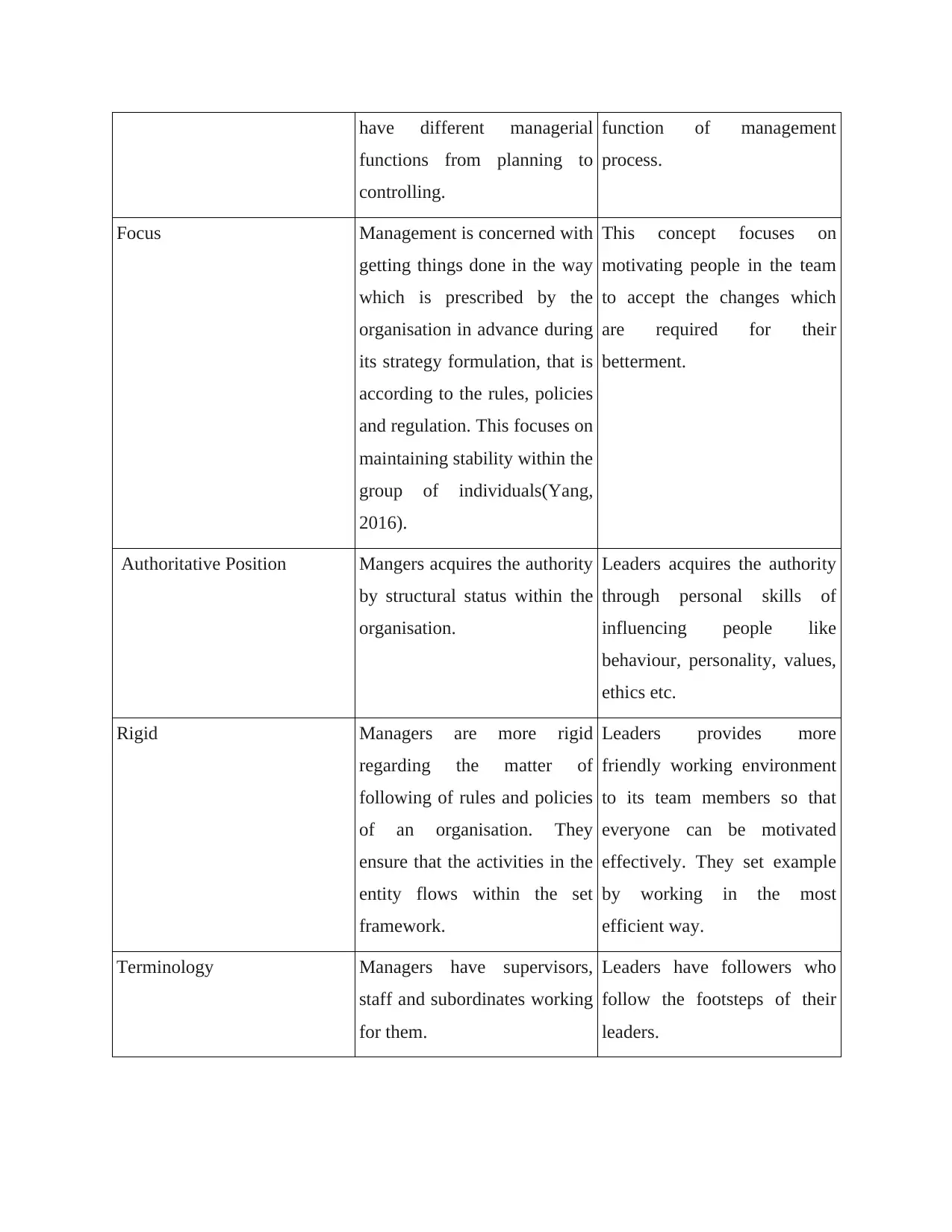
have different managerial
functions from planning to
controlling.
function of management
process.
Focus Management is concerned with
getting things done in the way
which is prescribed by the
organisation in advance during
its strategy formulation, that is
according to the rules, policies
and regulation. This focuses on
maintaining stability within the
group of individuals(Yang,
2016).
This concept focuses on
motivating people in the team
to accept the changes which
are required for their
betterment.
Authoritative Position Mangers acquires the authority
by structural status within the
organisation.
Leaders acquires the authority
through personal skills of
influencing people like
behaviour, personality, values,
ethics etc.
Rigid Managers are more rigid
regarding the matter of
following of rules and policies
of an organisation. They
ensure that the activities in the
entity flows within the set
framework.
Leaders provides more
friendly working environment
to its team members so that
everyone can be motivated
effectively. They set example
by working in the most
efficient way.
Terminology Managers have supervisors,
staff and subordinates working
for them.
Leaders have followers who
follow the footsteps of their
leaders.
functions from planning to
controlling.
function of management
process.
Focus Management is concerned with
getting things done in the way
which is prescribed by the
organisation in advance during
its strategy formulation, that is
according to the rules, policies
and regulation. This focuses on
maintaining stability within the
group of individuals(Yang,
2016).
This concept focuses on
motivating people in the team
to accept the changes which
are required for their
betterment.
Authoritative Position Mangers acquires the authority
by structural status within the
organisation.
Leaders acquires the authority
through personal skills of
influencing people like
behaviour, personality, values,
ethics etc.
Rigid Managers are more rigid
regarding the matter of
following of rules and policies
of an organisation. They
ensure that the activities in the
entity flows within the set
framework.
Leaders provides more
friendly working environment
to its team members so that
everyone can be motivated
effectively. They set example
by working in the most
efficient way.
Terminology Managers have supervisors,
staff and subordinates working
for them.
Leaders have followers who
follow the footsteps of their
leaders.
Paraphrase This Document
Need a fresh take? Get an instant paraphrase of this document with our AI Paraphraser
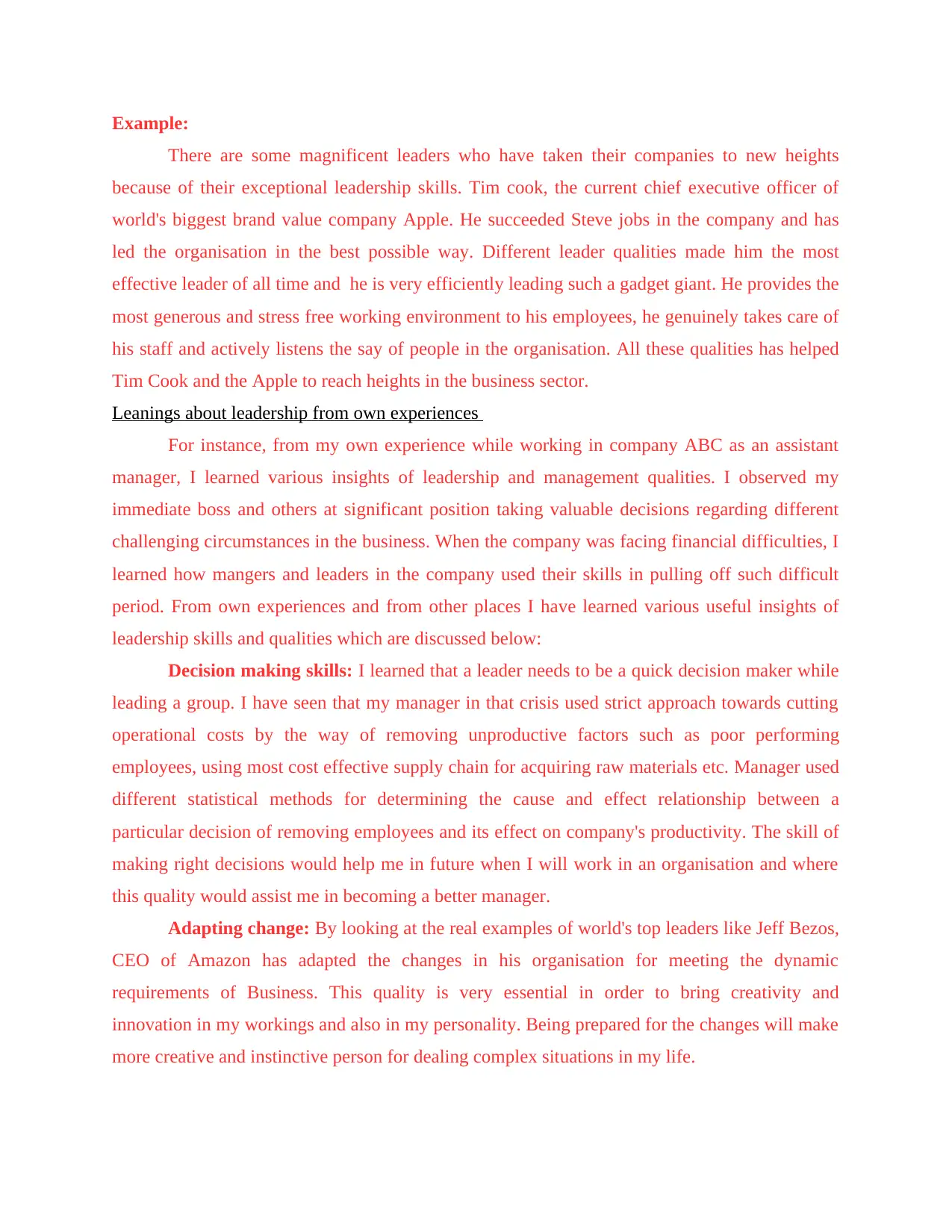
Example:
There are some magnificent leaders who have taken their companies to new heights
because of their exceptional leadership skills. Tim cook, the current chief executive officer of
world's biggest brand value company Apple. He succeeded Steve jobs in the company and has
led the organisation in the best possible way. Different leader qualities made him the most
effective leader of all time and he is very efficiently leading such a gadget giant. He provides the
most generous and stress free working environment to his employees, he genuinely takes care of
his staff and actively listens the say of people in the organisation. All these qualities has helped
Tim Cook and the Apple to reach heights in the business sector.
Leanings about leadership from own experiences
For instance, from my own experience while working in company ABC as an assistant
manager, I learned various insights of leadership and management qualities. I observed my
immediate boss and others at significant position taking valuable decisions regarding different
challenging circumstances in the business. When the company was facing financial difficulties, I
learned how mangers and leaders in the company used their skills in pulling off such difficult
period. From own experiences and from other places I have learned various useful insights of
leadership skills and qualities which are discussed below:
Decision making skills: I learned that a leader needs to be a quick decision maker while
leading a group. I have seen that my manager in that crisis used strict approach towards cutting
operational costs by the way of removing unproductive factors such as poor performing
employees, using most cost effective supply chain for acquiring raw materials etc. Manager used
different statistical methods for determining the cause and effect relationship between a
particular decision of removing employees and its effect on company's productivity. The skill of
making right decisions would help me in future when I will work in an organisation and where
this quality would assist me in becoming a better manager.
Adapting change: By looking at the real examples of world's top leaders like Jeff Bezos,
CEO of Amazon has adapted the changes in his organisation for meeting the dynamic
requirements of Business. This quality is very essential in order to bring creativity and
innovation in my workings and also in my personality. Being prepared for the changes will make
more creative and instinctive person for dealing complex situations in my life.
There are some magnificent leaders who have taken their companies to new heights
because of their exceptional leadership skills. Tim cook, the current chief executive officer of
world's biggest brand value company Apple. He succeeded Steve jobs in the company and has
led the organisation in the best possible way. Different leader qualities made him the most
effective leader of all time and he is very efficiently leading such a gadget giant. He provides the
most generous and stress free working environment to his employees, he genuinely takes care of
his staff and actively listens the say of people in the organisation. All these qualities has helped
Tim Cook and the Apple to reach heights in the business sector.
Leanings about leadership from own experiences
For instance, from my own experience while working in company ABC as an assistant
manager, I learned various insights of leadership and management qualities. I observed my
immediate boss and others at significant position taking valuable decisions regarding different
challenging circumstances in the business. When the company was facing financial difficulties, I
learned how mangers and leaders in the company used their skills in pulling off such difficult
period. From own experiences and from other places I have learned various useful insights of
leadership skills and qualities which are discussed below:
Decision making skills: I learned that a leader needs to be a quick decision maker while
leading a group. I have seen that my manager in that crisis used strict approach towards cutting
operational costs by the way of removing unproductive factors such as poor performing
employees, using most cost effective supply chain for acquiring raw materials etc. Manager used
different statistical methods for determining the cause and effect relationship between a
particular decision of removing employees and its effect on company's productivity. The skill of
making right decisions would help me in future when I will work in an organisation and where
this quality would assist me in becoming a better manager.
Adapting change: By looking at the real examples of world's top leaders like Jeff Bezos,
CEO of Amazon has adapted the changes in his organisation for meeting the dynamic
requirements of Business. This quality is very essential in order to bring creativity and
innovation in my workings and also in my personality. Being prepared for the changes will make
more creative and instinctive person for dealing complex situations in my life.
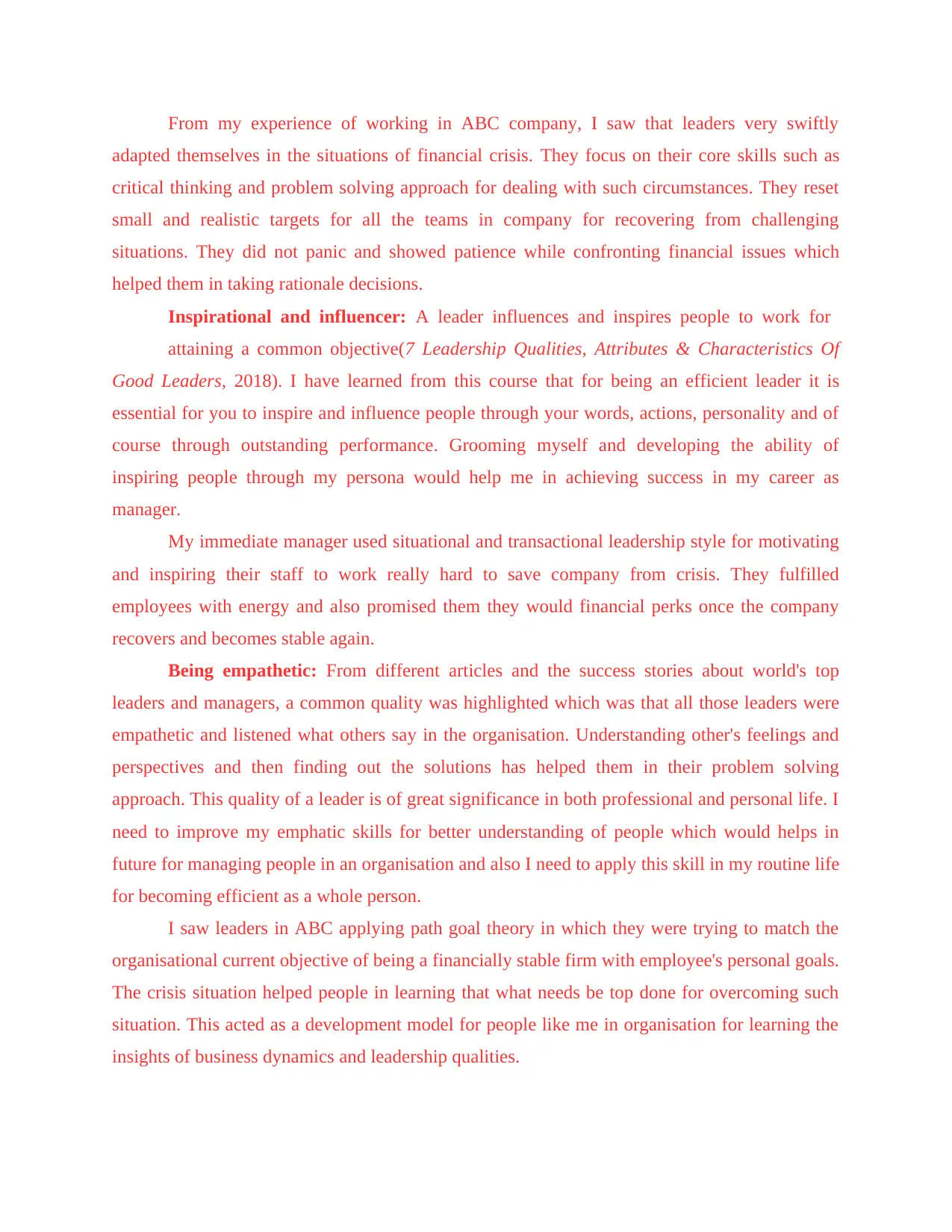
From my experience of working in ABC company, I saw that leaders very swiftly
adapted themselves in the situations of financial crisis. They focus on their core skills such as
critical thinking and problem solving approach for dealing with such circumstances. They reset
small and realistic targets for all the teams in company for recovering from challenging
situations. They did not panic and showed patience while confronting financial issues which
helped them in taking rationale decisions.
Inspirational and influencer: A leader influences and inspires people to work for
attaining a common objective(7 Leadership Qualities, Attributes & Characteristics Of
Good Leaders, 2018). I have learned from this course that for being an efficient leader it is
essential for you to inspire and influence people through your words, actions, personality and of
course through outstanding performance. Grooming myself and developing the ability of
inspiring people through my persona would help me in achieving success in my career as
manager.
My immediate manager used situational and transactional leadership style for motivating
and inspiring their staff to work really hard to save company from crisis. They fulfilled
employees with energy and also promised them they would financial perks once the company
recovers and becomes stable again.
Being empathetic: From different articles and the success stories about world's top
leaders and managers, a common quality was highlighted which was that all those leaders were
empathetic and listened what others say in the organisation. Understanding other's feelings and
perspectives and then finding out the solutions has helped them in their problem solving
approach. This quality of a leader is of great significance in both professional and personal life. I
need to improve my emphatic skills for better understanding of people which would helps in
future for managing people in an organisation and also I need to apply this skill in my routine life
for becoming efficient as a whole person.
I saw leaders in ABC applying path goal theory in which they were trying to match the
organisational current objective of being a financially stable firm with employee's personal goals.
The crisis situation helped people in learning that what needs be top done for overcoming such
situation. This acted as a development model for people like me in organisation for learning the
insights of business dynamics and leadership qualities.
adapted themselves in the situations of financial crisis. They focus on their core skills such as
critical thinking and problem solving approach for dealing with such circumstances. They reset
small and realistic targets for all the teams in company for recovering from challenging
situations. They did not panic and showed patience while confronting financial issues which
helped them in taking rationale decisions.
Inspirational and influencer: A leader influences and inspires people to work for
attaining a common objective(7 Leadership Qualities, Attributes & Characteristics Of
Good Leaders, 2018). I have learned from this course that for being an efficient leader it is
essential for you to inspire and influence people through your words, actions, personality and of
course through outstanding performance. Grooming myself and developing the ability of
inspiring people through my persona would help me in achieving success in my career as
manager.
My immediate manager used situational and transactional leadership style for motivating
and inspiring their staff to work really hard to save company from crisis. They fulfilled
employees with energy and also promised them they would financial perks once the company
recovers and becomes stable again.
Being empathetic: From different articles and the success stories about world's top
leaders and managers, a common quality was highlighted which was that all those leaders were
empathetic and listened what others say in the organisation. Understanding other's feelings and
perspectives and then finding out the solutions has helped them in their problem solving
approach. This quality of a leader is of great significance in both professional and personal life. I
need to improve my emphatic skills for better understanding of people which would helps in
future for managing people in an organisation and also I need to apply this skill in my routine life
for becoming efficient as a whole person.
I saw leaders in ABC applying path goal theory in which they were trying to match the
organisational current objective of being a financially stable firm with employee's personal goals.
The crisis situation helped people in learning that what needs be top done for overcoming such
situation. This acted as a development model for people like me in organisation for learning the
insights of business dynamics and leadership qualities.
⊘ This is a preview!⊘
Do you want full access?
Subscribe today to unlock all pages.

Trusted by 1+ million students worldwide
1 out of 16
Related Documents
Your All-in-One AI-Powered Toolkit for Academic Success.
+13062052269
info@desklib.com
Available 24*7 on WhatsApp / Email
![[object Object]](/_next/static/media/star-bottom.7253800d.svg)
Unlock your academic potential
Copyright © 2020–2025 A2Z Services. All Rights Reserved. Developed and managed by ZUCOL.




